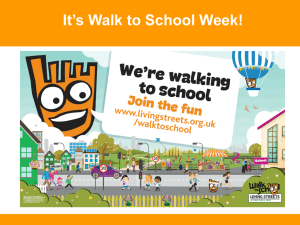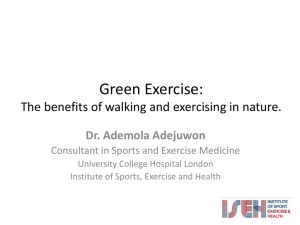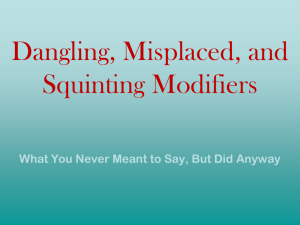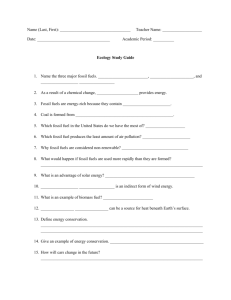walking speech
advertisement
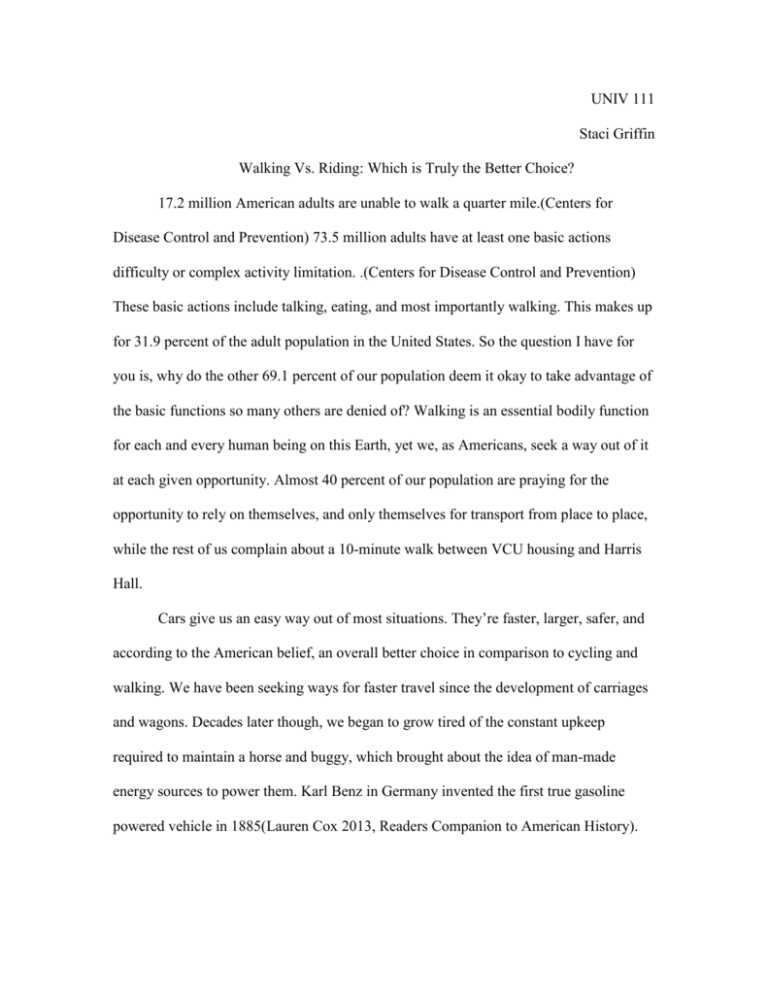
UNIV 111 Staci Griffin Walking Vs. Riding: Which is Truly the Better Choice? 17.2 million American adults are unable to walk a quarter mile.(Centers for Disease Control and Prevention) 73.5 million adults have at least one basic actions difficulty or complex activity limitation. .(Centers for Disease Control and Prevention) These basic actions include talking, eating, and most importantly walking. This makes up for 31.9 percent of the adult population in the United States. So the question I have for you is, why do the other 69.1 percent of our population deem it okay to take advantage of the basic functions so many others are denied of? Walking is an essential bodily function for each and every human being on this Earth, yet we, as Americans, seek a way out of it at each given opportunity. Almost 40 percent of our population are praying for the opportunity to rely on themselves, and only themselves for transport from place to place, while the rest of us complain about a 10-minute walk between VCU housing and Harris Hall. Cars give us an easy way out of most situations. They’re faster, larger, safer, and according to the American belief, an overall better choice in comparison to cycling and walking. We have been seeking ways for faster travel since the development of carriages and wagons. Decades later though, we began to grow tired of the constant upkeep required to maintain a horse and buggy, which brought about the idea of man-made energy sources to power them. Karl Benz in Germany invented the first true gasoline powered vehicle in 1885(Lauren Cox 2013, Readers Companion to American History). At this time, cheap raw materials were at the palm of our hands in the United States, which allowed for easy production, and smooth distribution. To most of us, this was an evolution, but behind the scenes this was the first step in the destruction of both our environment and our physical health. Obesity is a primary issue in the United States right now. According to the American College Health Association, the percent of overweight and obese American college students increased from 27.4 percent in fall 2006 to 29.2 percent in fall 2011. (Jenni Pompi 2012) Relying on cars and automobile only increases the severity of this issue, as it allows us to think our lazy habits are compensated for. Regardless of our destination, we typically take it upon ourselves to find a seat there, in order to remain comfortable. Walking to get to these destinations is the small segment of exercise we could use to counteract this “consistent sitting”. Instead, we sit down in our cars, drive where we need to go, and sit down once again in our offices, lobbies, and classrooms. In our society, faster is always better, primarily due the fact that when we slow down and think about the affects of what we’re doing, we probably wouldn’t do it so candidly. The US Department of Transportation suggests that increasing walking will decrease the level of air pollution in our atmosphere caused by car emissions. “By far the greatest environmental benefit of bicycling and walking, however, is that they bypass the fossil fuel system to which the American economy has become addicted.” Walking is a major aid in breaking American dependency on these harmful fuels. Automobiles require tremendous amounts of these fuels not only while they’re in use, but during production as well. Global warming has been a substantial issue in America, and all over the world for quite some time now. It is primarily caused by the overuse of fossil fuels. By walking more, these detrimental emissions can be cut back dramatically. The emissions caused by fossil fuels are equally as detrimental to us as the epidemic of obesity, but if you feel you still can’t relate to either of these issues, I ask you this. Have you ever considered the amount of money, we specifically as VCU students spend on driving in this city? The toll to park in Richmond is seventy-five cents per hour, meaning if you were to attempt to drive just two places per day you would be spending a total of one dollar and fifty cents. A dollar and fifty cents every day for total of 8 months, the equivalent to our school year on campus, would add up to three hundred and sixty dollars, exclusively spent on parking. Meanwhile, Richmond has one of the highest poverty rates within the state. People on our streets beg and plead for the loose change in our pockets while we waste it endlessly on a place to park the machines fueling our apathy. Richard Mckenzie believes the argument of cars being more polluting than walkers is flawed in that it does not compensate for the calories expended while walking that must made up for. This demand creates more pressure on the food industry. “The nation's entire food industry—ranging from the production of fertilizer and pesticides to crops and livestock to food processing, packaging, and transportation and then on to food preparation by consumers—uses nearly a fifth of the fossil energy burned annually in the United States.”(Mckenzie) Growing crops and raising animals for consumption requires ample energy, and equipment which produce more greenhouse emissions than average automobiles. Several industries in the US are sharing the problem of using too many fossil fuels. The economic stability of our food industry is entire new debate in itself, and should never shirk us to live a more active lifestyle. Calorie consumption is completely voluntary, and unable to be measured on a mass scale, as it would need to be in order to prove Mckenzie’s arguement. Especially in comparison to the numerous statistics already in existence, showing the cause and effect reaction of automobiles and fossil fuels on the environment and our health. The bottom line is that a loss of calories does not and will not pollute the environment or our bodies, as cars will. For most of us it’s actually quite the benefit. VCU implements several ways for us to “go green” and “conserve the Earth”, but the best way possible to have an extensive effect on our environment is through the conservation of fossil fuels. If you and two of your friends find yourselves in need to get to the same location, walk together! Why is it necessary to triple the gas usage in order to get there? It isn’t, and the moment more students begin realizing this, we can start decreasing other issues such as the congestion of traffic on Broad St. every morning. Walking is much more beneficial than what we give it credit for. What better place to open your mind to getting healthy than an open campus, where walking is the main source of transportation regardless? VCU constantly implores us to get involved with more “go-green” activities, and amongst all of them walking is surely the easiest. As a fellow VCU student and young adult, I understand the importance cars play in our lives. So I’m simply asking you to walk a little more, and drive a lot less. The effects driving are having on us and our environment are not irreversible. It’s never too late to change your habits for a cause that will truly benefit you in the long run. Transportation Demand Encyclopedia. “ Automobile Dependency.” Victoria Transport Policy Institute. Web 31 June 2014 <http://www.vtpi.org/tdm/tdm100.htm> Eric Foner and John A. Garraty, Editors.” The Reader’s Companion to American History “Copyright © 1991. Houghton Mifflin Harcourt Publishing Company Pompi, Jenni. "College Students' Weighty Choices Bring Obesity to Forefront." Bowie, Maryland Patch. 23 May 2012. Web. 5 Dec. 2014. <http://patch.com/maryland/bowie/college-students-weighty-choices-bring-obesity-toforefront>. Mckenzie, RIchard. "Why Walking to Work Can Be More Polluting Than Driving to Work." Richard B. McKenzie,. Web. 5 Dec. 2014. <http://www.econlib.org/library/Columns/y2013/McKenziewalking.html>. Centers for Disease Control and Prevention. Centers for Disease Control and Prevention, 14 May 2014. Web. 5 Dec. 2014. <http://www.cdc.gov/nchs/fastats/disability.htm>.
